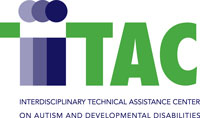December 18, 2017

|
Federally funded through the Health Resources and Services Administration's Maternal and Child Health Bureau, the nation's 52 Leadership Education in Neurodevelopmental Disabilities (LEND) and 10 Developmental-Behavioral Pediatrics (DBP) Programs provide long-term, graduate level training to over 3,000 students each year, as well as coordinated, interdisciplinary care to children with special health needs. For more than six decades, LENDs and DBPs have played a leading role in advancing our knowledge of and services for people with disabilities and their families as they teach clinical excellence, model inclusion, work across systems to promote quality services, and advance policy, research and practice. The Association of University Centers on Disabilities (AUCD) supports this collective mission by providing technical assistance to these program though the Interdisciplinary Technical Assistance Center on Autism and Developmental Disabilities (ITAC). ITAC staff survey programs in several ways each year to identify technical assistance needs and then offer Focused Assistance to Support Training (FAST) Projects to programs with pilot projects that can address these network priorities.
In the most 2016-2017 program needs assessment data, the following four priority technical assistance needs were identified by LEND and DBP training programs:
- Increasing trainee and faculty diversity
- Demonstrating program impact through data collection and analysis
- Incorporating / expanding the use of technology in training
- Providing statewide technical assistance and/or short-term training
In July of 2017, AUCD indicated an ability to provide supplementary funding and targeted assistance to programs working to address these identified areas of need in ways that could be replicated by other programs or could benefit the broader network. After careful review of a diverse pool of program proposals, five programs were selected to receive up to $8,000 in supplemental funding.
- Boston Children's Hospital DBP is improving the training of fellows and residents by developing a web-based evaluation system to promote and sustain formative and bi-directional feedback for fellows in clinical training and their faculty in didactic training.
- Cincinnati LEND (The University of Cincinnati) and Nisonger Center LEND (The Ohio State University) are partnering to facilitate state-wide training in Ohio on the opioid epidemic and its impact on children via web based training technology.
- New Mexico LEND (The University of New Mexico) is leading a project with the PacWest LEND Consortium that will increase diversity in participating programs by leveraging a train-the-trainer model to increase mentorship capacity of racially and ethnically diverse faculty who will then support the leadership and success of racially and ethnically diverse trainees.
- Stanford DBP is expanding its program evaluation processes by gathering and analyizing medium- and long-term outcome data for pediatrics residents trained in their 4 week DBP rotation.
- The Wisconsin LEND (Waisman Center of the University of Wisconsin-Madison) is leading a collaborative effort in partnership with the LEND of Pittsburgh and the Nisonger LEND to examine the impact of LEND training outcomes and on the knowledge, attitudes, and skills of LEND trainees and comparison peers two years after completion of LEND training through a revised set of follow up survey questions.
This is the third year that ITAC has supported quality improvement efforts through this mechanism. During the funding period, which ends in June of 2018, AUCD staff will provide individualized assistance to the funded programs and facilitate multiple peer-to-peer learning opportunities.
Each of these programs will be reporting on their process and outcomes as well as sharing materials and products to the LEND and DBP networks through the AUCD website. For more information, please contact Sarah DeMaio, AUCD's Program Manager for MCH Technical Assistance, at (240)821-94613 or [email protected].